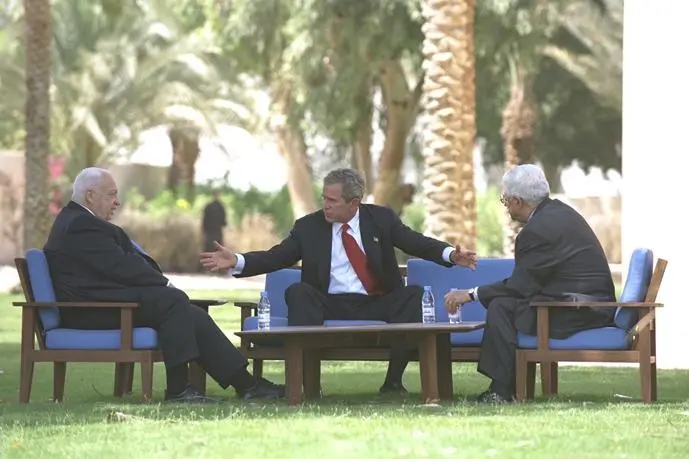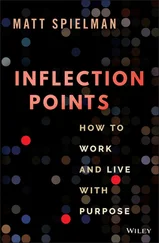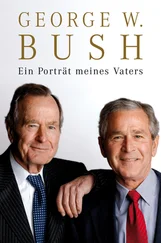The day after the speech, I flew to Kananaskis, Canada, for the annual G-8 meeting. The summit was supposed to focus on foreign aid, but my speech on the Middle East was on everyone’s mind. I ran into Tony Blair in the gym the morning before the first meeting. “You’ve really kicked up quite a storm, George,” he said with a smile.
Others were less accepting. Jacques Chirac, European Commission President Romano Prodi, and Canadian Prime Minister Jean Chrétien clearly disapproved. By rejecting Arafat, the heralded Nobel Peace Prize winner, I had upended their worldview. I told them I was convinced Arafat would never prove a reliable partner for peace.
Colin took the lead in hammering out a detailed plan to move from my speech to a Palestinian state. Called the Roadmap, it included three phases: First, Palestinians would stop terrorist attacks, fight corruption, reform their political system, and hold democratic elections. In return, Israel would withdraw from unauthorized settlements. In the second phase, the two sides would begin direct negotiations, leading to the creation of a provisional Palestinian state. In the third phase, the Palestinians and Israelis would resolve the most complicated issues, including the status of Jerusalem, the rights of Palestinian refugees, and permanent borders. Arab nations would support the negotiations and establish normal relations with Israel.
With Tony Blair’s encouragement, I decided to announce the Roadmap in the spring of 2003, shortly after we removed Saddam Hussein from Iraq. Both the Israelis and Palestinians supported the plan. In early June, I met with Arab leaders in Sharm el Sheikh, Egypt, to stress my commitment to peace and urge them to stay engaged in the process. Then I traveled to Aqaba, Jordan, for a session with Palestinian and Israeli representatives.
Given all the recent bloodshed, I expected a tense session. To my surprise, the mood was friendly and relaxed. It was clear many leaders knew one another from previous peace efforts. But I knew there was a lot of history to overcome. Mohammad Dahlan, the Palestinian security chief, liked to remind people where he had learned to speak fluent Hebrew: in the Israeli jails.
The Palestinians had taken an important step by naming a prime minister to represent them at the summit, Mahmoud Abbas. Abbas was a friendly man who seemed to genuinely want peace. He was a little unsure of himself, partly because he hadn’t been elected and partly because he was trying to emerge from Arafat’s shadow. He said he was willing to confront the terrorists. But before he could turn his words into action, he needed money and reliable security forces.
After the formal meetings, I invited Sharon and Abbas to take a walk on the lawn. Under the palm trees, I told them we had a historic opportunity for peace. Ariel Sharon made clear—at Aqaba and later in his landmark Herzliya speech—that he had abandoned the Greater Israel policy, an enormous breakthrough. “It is in Israel’s interest not to govern the Palestinians, but for the Palestinians to govern themselves in their own state,” he said at Aqaba. Abbas declared, “The armed intifada must end and we must use and resort to peaceful means in our quest to end the occupation and the suffering of Palestinians and Israelis.” We had a long way to go, but it was a hopeful moment in the Middle East.

With Ariel Sharon ( left ) and Mahmoud Abbas in Aqaba, Jordan. White House/Eric Draper

In April 2004, Ariel Sharon came to Washington to brief me on a historic decision: He planned to withdraw from Israel’s settlements in Gaza and parts of the northern West Bank. As a father of the settlement movement, it would be agonizing for him to tell Israeli families they had to leave their homes. But his bold move achieved two important goals: It extricated Israel from the costly occupation of Gaza. And by returning territory to Palestinian control, it served as a down payment on a future state.
I was hopeful that Abbas would match Sharon’s tough decision with a positive step. But in September 2003, Prime Minister Abbas resigned after Arafat undermined him at every turn. Just over a year later, Arafat died. In January 2005, Palestinian voters went to the polls for the first time in a decade. Abbas campaigned on a platform to halt violence and resume progress toward a Palestinian state. He was elected in a landslide. He set to work developing the institutions of a democratic state and called for legislative elections.
Abbas’s party, Fatah, was still tainted with the corruption of the Arafat era. The main alternative was Hamas, a terrorist organization that also had a well-organized political apparatus. The prospect of a Hamas victory understandably unnerved the Israelis.
I supported the elections. America could not be in the position of endorsing elections only when we liked the projected outcome. I knew the election would be just one step on the journey to democracy. Whoever won would inherit the responsibilities of governing—building roads and schools, enforcing the rule of law, and developing the institutions of a civil society. If they performed well, they would be reelected. If not, the people would have a chance to change their minds. Whatever the outcome, free and fair elections reveal the truth.
On January 25, 2006, the truth was that Palestinians were tired of Fatah’s corruption. Hamas won 74 of 132 seats. Some interpreted the results as a setback for peace. I wasn’t so sure. Hamas had run on a platform of clean government and efficient public services, not war with Israel.
Hamas also benefited from Fatah’s poorly run campaign. Fatah often ran multiple candidates for the same seat, which split the party vote. The election made clear that Fatah had to modernize its party. It also forced a decision within Hamas: Would it fulfill its promise to govern as a legitimate party, or would it revert to violence?

In March 2006, voters went to the polls for another election. This one was in Israel. Two months earlier, Ariel Sharon had suffered a debilitating stroke. I’ve always wondered what might have been possible if Ariel had continued to serve. He had established his credibility on security, he had the trust of the Israeli people, and I believe he could have been part of a historic peace.
The vote for a new prime minister would be a test of Israeli commitment to the two-state solution. Deputy Prime Minister Ehud Olmert campaigned hard in support of it. I had met Ehud on my 1998 trip to Israel, when he was mayor of Jerusalem. He was easygoing and confident, with a gregarious manner and a ready laugh. “The only solution now is two states—one Jewish, one Palestinian,” he said during the campaign. At one point, he suggested he would create a Palestinian state unilaterally if necessary. Israeli voters rewarded him at the polls.
Olmert and Abbas, who retained the presidency despite Hamas’s victory in the legislative elections, quickly developed a working relationship. They found agreement on issues such as security checkpoints and the release of some prisoners. Then, in June 2007, the militant wing of Hamas intervened. In a familiar pattern in the ideological struggle, the extremists responded to the advance of freedom with violence. Hamas terrorists backed by Iran and Syria mounted a coup and seized control of Gaza. Fighters in black masks ransacked Fatah headquarters, threw party leaders off rooftops, and targeted moderate members of Hamas’s political wing.
Читать дальше













